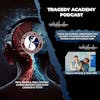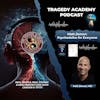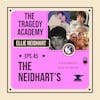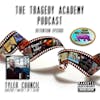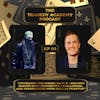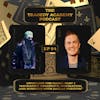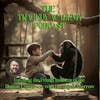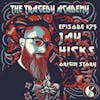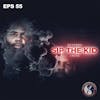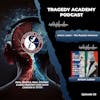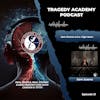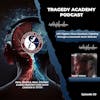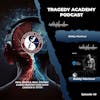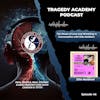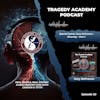

Scott Edwards - Comedy Club Pioneer & Entrepreneur
In this episode of The Tragedy Academy Podcast, hosts Jay Hicks and cohost Gary DeFranco explore the fascinating world of comedy clubs and entrepreneurship with guest Scott Edwards, a true pioneer in the comedy scene. 🎙️
Scott Edwards shares his incr...

In this episode of The Tragedy Academy Podcast, hosts Jay Hicks and cohost Gary DeFranco explore the fascinating world of comedy clubs and entrepreneurship with guest Scott Edwards, a true pioneer in the comedy scene. 🎙️
Scott Edwards shares his incredible journey from launching one of the first comedy clubs in the US to working with legends like Bob Saget, Jay Leno, and Robin Williams. With over 40 years in show business, Scott's stories span the hilarious to the heartfelt, offering unique insights into the world of comedy and beyond. This episode is a must-listen for anyone intrigued by the magic of stand-up comedy, the trials and tribulations of entrepreneurship, and the unforgettable personalities that have graced the stage. Dive into an engaging conversation that reveals the power of laughter, the impact of tragedy on creativity, and the importance of pursuing your passions. 🤣💼
Key Takeaways:
🎭 Scott Edwards' journey from starting one of America's first comedy clubs to becoming a respected figure in the comedy world.
🤝 The role of comedy in bridging societal divides and creating a space for empathy and understanding.
🌟Insights into working with comedy legends and witnessing the evolution of stand-up over the decades.
💡The therapeutic power of comedy in addressing personal and societal challenges.
🎤The impact of authentic storytelling and humor in connecting with audiences and fostering a sense of community.
Scott Edwards Bio:
Scott Edwards is a visionary entrepreneur and comedy club pioneer with over 40 years of experience in the entertainment industry. Having worked with comedy greats and launched over ten successful businesses, Scott's expertise spans live-stage shows, TV production, and entrepreneurship. His passion for comedy and knack for storytelling has made him a beloved figure in the comedy community and beyond.
Remember to subscribe to The Tragedy Academy Podcast on your favorite platform! Share this episode with friends who love comedy, are intrigued by the intricacies of entrepreneurship, or simply enjoy captivating stories. Join us as we continue to explore the human experience through the lens of tragedy and triumph. Be cool and keep learning. 🎧👥
For more insights and laughter from Scott Edwards, follow him on social media and check out his latest projects. Dive deeper into the world of comedy and entrepreneurship with a pioneer who has seen it all. Take advantage of the wisdom and wit Scott brings to every conversation. 🌟📲
Thank you for joining us for another episode of The Tragedy Academy Podcast. Remember, laughter is a universal language; through it, we can find common ground and understanding. Tune in next week for more stories, laughs, and lessons. Be cool and keep learning. 😄📚
🚀 Welcome to The Tragedy Academy Podcast 🚀
Immerse yourself in the transformative power of The Tragedy Academy Podcast, an extraordinary platform showcasing stories of resilience and redemption. As we unravel the rich tapestry of human experiences, our episodes meld wisdom with wit, enlightening and entertaining. Hosted with profound empathy, we delve into the indomitable spirit of our guests, providing our audience with opportunities to gain insights, share laughter, and experience growth. Become a part of our community that values genuine connections and collective healing through the strength of shared narratives.
📲 Connect with Us!
Explore more about The Tragedy Academy:https://www.thetragedyacademy.com
🌟 Support and Grow With Us 🌟
🎧 Podcasting Made Easy: Build your stunning podcast website with Podpage:
Podpage: https://bit.ly/3LSCBh5.
📲Take your recording to the next level with Riverside.fm
Riverside.FM: https://bit.ly/3ImjNWD
👕 Get the Gear Loved Jay's t-shirt from the latest episode? Grab yours at Into the AM.
Into the AM: https://bit.ly/431MLD5.
📘 Expand Your Mind Dive into our recommended reads at our Bookshop.
Bookshop: https://bit.ly/42pPHcv.
✅ Stay Updated – Subscribe! Subscribe to our YouTube Channel and never miss an episode.
📱 Follow Us on Social Media
- Instagram: @thetragedyacademypodcast
- Facebook:@TheTragedyAcademyPodcast
- Twitter: @Tragedy_Academy
- TikTok: @thetragedyacademy
💖 Support The Tragedy Academy. Your support helps us keep bringing meaningful content. Consider donating through PayPal or BuyMeACoffee.
PayPal Donate: https://www.paypal.com/donate?hosted_button_id=YMU9L4TBWX6AG
Buy Me a Coffee: https://www.buymeacoffee.com/tragedyacademy
The Tragedy Academy is a show created to bridge societal divides in a judgment-free zone using candor and humor.
Be cool. Keep Learning.
[00:00:00]
The Unconventional Start to the Show
[00:00:00] Jay: So yeah, that's why I had to move the time of the appointment, er, for our show. Because I was getting my head shrunk.
[00:00:06] Scott: you're in a good mental state. Let's all get together.
[00:00:10] Jay: Welcome to the Tragedy Academy, a show created to bridge societal divides in a judgment-free zone using candor and humor.
Introducing Scott Edwards: A Comedy Club Pioneer
[00:00:16] Jay: We are joined today by Scott Edwards. How are you doing today, Scott?
[00:00:20] Scott: Hey, I'm a little more excited. Ladies and gentlemen, it's Scott Edwards.
[00:00:25] Jay: Oh, there it is.
[00:00:28] Scott: Nice to have you here.
[00:00:30] Jay: Gary's gonna be mad he missed that. He fell out as soon as we started, which is amazing.
The Tragic Genius of Comedy Legends
[00:00:36] Jay: I like, I love, see. Here's the thing about this show, like I was saying when we came: It's the Tragedy Academy. It's baked into the name.
[00:00:45] Scott: It is the tragedy Academy, which begs for a little foreboding when you come on as a guest, but being on the comedy side and the business side, I felt like I could bring some [00:01:00] balance to your show.
[00:01:02] Jay: I do believe that. I think comedy is an extremely effective tool for Change, understanding, and bridging societal divides. It's part of the reason why the logo is what it is. It's a yin-yang—sadness and happiness. And if anybody embodies that, it's someone who's worked in the comedy industry and seen some of the most tortured souls that have ever walked the earth with the most pure comedy genius and views of reality.
Scott Edwards' Journey in the Comedy World
[00:01:35] Jay: Scott, tell us what you do and where you come from.
[00:01:38] Scott: ladies and gentlemen, I'm Scott Edwards. I'm out of the Northern California area, but, what Jay is alluding to is that I owned a chain of comedy clubs from, yes, I'm an older guy from 1980 to 2001. when I opened the club, it was the 12th full-time comedy club in the entire [00:02:00] US. And it is still operating today, not under my tutelage, but it's still out there.
[00:02:05] Scott: So it's now one of the oldest clubs in the country. And I'm very proud of that. And I did get a chance to work with a lot of narcissistic, damaged-goods people, but you know what? They were
[00:02:18] Jay: I think narcissistic there are some but I feel like the comedian world is filled with open wounds
[00:02:25] Scott: they're not all bad or all
[00:02:28] Jay: No, just
[00:02:29] Scott: stuff.
[00:02:29] Jay: like there's Something that has happened that's a catalyst to the sarcasm to the way that things are approached I mean look at people like Mitch Hedberg
[00:02:39] Scott: Oh man. Mitch was, Yeah,
[00:02:43] Jay: Robin Williams, like we're going straight into the most horrible scenarios. But we're talking about people who were comedic geniuses and wore some of the darkest mental health issues out in front of everybody.
[00:02:58] Scott: yeah, Bill Hicks, [00:03:00] Bobcat Goldthwaite, Paula Poundstone. They all had, Emo Phillips. Talk about esoteric and strange. There were some real, interesting personalities that came through the clubs, but you're right. Most of them Yeah. Thanks. I had a background of what you and I were talking about before you hit record about the average American family, where we all have some tragedy and drama in our lives.
[00:03:26] Scott: That in our youth that tends to affect who we are later, but then there's others that, Jerry Seinfeld, one of the funniest guys in America, you know, came from a fairly normal upper middle class, family. And he still has a great, You observation of the world and shares it comedically. And he's still outperforming today, even though he could buy and sell Trump.
[00:03:53] Jay: Probably good. And you're not wrong. I think that, just I talk about like [00:04:00] experiences or like lenses and glasses and that you get different prescriptions over time based on what you've been through. I feel like your comedic voice Does have that same set of filters that has what you put out based on what you've gone through and how you perceive things and you find your, people, so to speak, that feel you, they're on the same wavelength, that humor hits the same funny bone on both sides,
The Healing Power of Comedy
[00:04:25] Scott: I think that you're pointing out something that's so important in any sort of entertainment, but especially in stand-up comedy, J, and that is being able to relate to the audience. And so what's interesting is that people take their pain, find the funny in it, and then they share it with an audience in nine times out of 10, the audience has been through or known somebody that's been through a similar circumstance and bringing the funny to it really.
[00:04:54] Scott: Helps everybody. it's cathartic. that helps them get [00:05:00] over it and move on. And it's,
[00:05:04] Jay: strength in vulnerability, even if you hide it behind a laugh or a joke,
[00:05:08] Scott: right. Oh,
[00:05:08] Jay: Everybody should see it. It makes things so much better. Misery loves company, but enlightenment loves friends, right? When you're sitting together, you don't want to be the only dude who understands the scenario.
[00:05:21] Jay: That makes it really crappy every day. But if you have the chance to stand up there and bridge some divides as a comedian, the reason why I love it is you can call out some of the worst and most heinous fallacies in society. But you're not pointing at a person in the room. You're doing a test, a climate test.
[00:05:39] Jay: You're allowing somebody that may be that. Offending person inside of a larger group who is not aware of how heinous it is that they do these things every day until everybody in the room laughs, claps, and does all these things. And the offenders in the room, it's there, [00:06:00] you see it.
[00:06:01] Scott: Jay. Gary is back with us. Hi, Gary. Are you still there?
[00:06:06] Jay: going on, brother?
[00:06:07] Scott: Hey, it is, interesting that you bring up and you approach comedy this way, Jay, because it is, you're going a little, a level deeper than the average audience thinks about, they go in, they're paying money.
[00:06:23] Scott: So they're vested in being entertained and they want to hear. Funny stuff. What they don't usually understand, at least going in, is that to be really funny and to connect with the audience, the comic needs to talk about something that relates to the majority of the people in the room. And that's what kind of brings the group together.
[00:06:47] Scott: For example, you know, somebody says that, talks about,
[00:06:53] Standup Comedy Podcast Network: Uh,
[00:06:54] Scott: the challenging relationship with their father or something, and the comic [00:07:00] is poking fun at it and finding the funny in these challenging relationships. It's not just one guy or one person woman in the audience that might relate to that.
[00:07:10] Scott: They think it's just them. We all think our world is special, and
[00:07:14] Jay: so narcissistic as a being.
[00:07:17] Scott: But the reality is then, you hear the comic telling his story and finding the funny and then, oh, wow, that, yeah, that is funny. And then you see everybody else laughing, and you go, oh, I'm not the only one with a screwed-up father.
[00:07:31] Scott: Oh, I get it. Okay. And that helps, is cohesive for the audience and brings them together. And what's. It was really neat from a producer's point of view, which is my role, was that a group of people is sharing an experience that will never happen again because every audience is different, every line is different, even a comic that does the same bit every night.
[00:07:59] Scott: Yeah, it's [00:08:00] always nuance, and the audience is always different. And so the reaction is always different. And who's relating is always different. A lot of people don't realize what's really fascinating about stand-up comedy versus, let's say, music or a play or a movie is that the moment that lives aspect of it, that everybody is bonding and relating to is in my mind, magical because it'll never happen again.
[00:08:25] Jay: That's an amazing way to look at it, and you're not wrong. We live in the now, so there is no future. There is no past, and if you're definitely sitting there together, if you're not taking in that same energy from everybody else in the room, you're the odd man out. We know who that person is. They're the ones saying something from the side. I did watch this video on TikTok today.
[00:08:45] Jay: I love stand-up, right? There was a video of this comedian, and I cannot remember his name, but he had made a joke about autism for whatever reason. I didn't hear it, but there was a woman, and it cut right into it where the woman was, [00:09:00] interjected. I didn't like what you said about autism.
[00:09:03] Jay: I have a son with autism or somebody with autism in the family. And he just stood there and looked at her for a while. And then, basically, he's so you. You realize now that it's probably an awkward scenario that you've pointed this out, and I'm still looking at you. You don't really know what to do.
[00:09:23] Jay: And basically what it came down to was, you see, you're actually a poster child for the understanding of autism because you are going to recognize the social cues and realize that you probably shouldn't be cutting into a set. And you can hear the woman. Yeah.
[00:09:42] Scott: Yeah. she realized.
[00:09:44] Jay: and I don't even, this isn't like the anti-autism podcast,
[00:09:49] Scott: no, but it's interesting because I have a comic, great short swim that does a whole bit about autism and it's because his daughter [00:10:00] has autism. And so to deal with the tragedy of An emotionally challenged child. He finds the fun in it. And then by going on stage and talking about it. With the unique situations that happen with his daughter, he's bringing the audience along on a journey, on a story that educates them about autism.
[00:10:20] Scott: It also makes them realize that despite the difficulties and challenges, there's a lot of love and joy that he has with his daughter because of her special nature. And so it enlightens the audience while entertaining him.
[00:10:37] Jay: And I firmly believe that's the best way to convey change. By shedding light, there's strength and vulnerability. When someone like that gets on stage and says those things, you are correct about everything that you said. And there's also an additional byproduct. You're giving the people that are actively living in that scenario a voice.
[00:10:59] Jay: You're showing [00:11:00] them that they're allowed to speak out loud about what they're going through with their family member who might have that particular special need. That's worth its weight in gold.
[00:11:10] Scott: we've seen it a lot recently on even America's Got Talent, where you've had some people with physical disabilities that are getting on and they're still funny by poking fun at their own disabilities. And what it does is it not only makes them a hero because they've overcome their challenges and found the humor.
[00:11:30] Scott: And are able to share it, but for the world that's watching them, they're going, because I have a physical disability doesn't mean I can't be funny or I can't, entertain. And that's an important message. As you said, it's sharing a positive, thing, but we're on the tragedy Academy.
[00:11:52] Scott: So maybe, we're going the wrong way.
[00:11:55] Jay: No, honestly, I think that tragedy creates [00:12:00] comedy.
[00:12:00] Scott: No, it's
[00:12:00] Jay: in retrospect, you have to laugh at things, right? No, you're not wrong. a lot of people tune into this show, they jump on, they're like, oh, it's about people's tragedies, and I'm like, no, it's not.
[00:12:15] Jay: Take two seconds. First of all, Google what Non-Purus Scolam means. It's on the bottom of the logo. If you take this place seriously, you're an idiot because it is not a real school.
[00:12:26] Scott: You put it there. it's in
[00:12:29] Gary: wish I went to
[00:12:30] Jay: plain as day. it's an academy. You don't put Eat at Joe's in regular language at the bottom of the batch. I put non-purus scolum, right? So
[00:12:41] Jay: we, you a tribute for being original.
[00:12:46] Jay: here we go. Love it. Gary, man, how are you doing there? Now, he lives in the land of comedy as well. There's a lot of comics that come through where he lives, so I'd love to hear your take [00:13:00] on it, man. Oh,
Navigating the Complexities of Stand-Up Comedy
[00:13:01] Gary: I was thinking about when you talk about the autism bit, Shane Gillis is one of my favorite current comedians, and he's got a bit about his uncle with Down syndrome, and he got tons of shit about it. And he makes like good points. He's all these people are on antidepressants and Zoloft.
[00:13:19] Gary: He's my uncle's on Capri Suns. He's the fucking happiest guy I know. it's
[00:13:24] Jay: You're not wrong, man.
[00:13:26] Gary: Yeah, like they want to talk about, or they don't want you to talk about anything, not about our differences not about Handicaps or perceived handicaps, and like comedy should be mostly off limits for the PC culture I Well, that's where we
[00:13:40] Scott: two things, the people that go to a comedy show and then turn around and complain and whine, or, get into their wokeness, I'm going, what the fuck are you doing at a comedy show?
[00:13:48] Jay: Thank
[00:13:49] Scott: Don't go. And then the other thing is standup comedy. And entertainment, really, in general, but let's say we're still focused on standup comedy. My background [00:14:00] is a reflection of the world, and the world has tragedy.
[00:14:05] Scott: The world has diseases. The world has special people. The world has troubled lifestyles in child raising that create a situation. And the value of stand-up comedy. I think brings to it is that it, pokes fun at it, that it's like what you said in your logo, the yin and yang, right?
[00:14:34] Scott: Yes. There are going to be hard times. We've all gone through hard times. That's called life. And comedy helps you balance that. It helps you poke fun at it. It helps you realize that, yeah, you may have challenging times, go through bankruptcy, go through a divorce, or have somebody in your family pass away. These are all parts of life.
[00:14:56] Scott: So if you, if a comic can poke fun [00:15:00] at that, find the funny, you're going to help balance and get through it that much better.
[00:15:07] Jay: The military Is worth its weight in gold. It's The military has made its whole entire life out of that you make jokes in the darkest times of things when you're going through shit or when you're training or whatever, Gary knows that in, the film industry, you guys end up dealing with so many situations where you're just stuck sitting around sucking your thumbs, doing BS, playing spades or some crap, that's just how it breaks down.
[00:15:34] Scott: to interrupt Jay, what are the happiest, funniest people? Morticians. deal
[00:15:43] Scott: with death every day and they all have a great sense of humor. Why?
[00:15:47] Jay: they aren't, they're okay with
[00:15:48] Scott: Yeah, they have to get through what they deal with every day, and they do that with a good sense of humor.
[00:15:55] Jay: that's,
[00:15:56] Scott: get a laugh.
[00:15:58] Jay: I was about to say, I think [00:16:00] everybody should probably have to do like a tour in the mortuary for a couple of months. Because I feel like a lot of the hang-up that we have in the human experience is not the ability to cope with the fact that we're going to die.
[00:16:12] Jay: We don't understand it, so we spend so much time spinning yarns, getting on stages, making jokes about the human experience, singing to each other, building buildings, all this other shit, all because we don't want to look at the finish line. The thing that we know that's coming, dude, Yeah. It's not like it's going to run away,
[00:16:28] Scott: It's hard to miss.
[00:16:29] Jay: we'll run backward just to never fucking see
[00:16:32] Scott: Yeah. Back when I was a senior in high school, one of my buddies had a job at a mortuary, and we would meet there and play poker every week.
[00:16:40] Jay: did you play on someone's stomach?
[00:16:43] Gary: Oh
[00:16:43] Scott: No,
[00:16:43] Scott: but it would be pretty funny.
[00:16:45] Jay: who gets the seat between the legs?
[00:16:47] Scott: My buddy would have to leave the game because they had to go pick up a body. But it was, it just puts right in front of you. The fact that [00:17:00] we're all mortal and we all have problems and issues, and one of the ways, one of the ways besides therapy or other things, is to be able to laugh.
[00:17:13] Scott: At the circumstances in our lives that are challenging and the really good comics, you mentioned a few that had some; Robin Williams is a great example of somebody who had some fairly deep issues and had challenges in his own life. And yet to the rest of the world, his machine gun style of comedy found humor for anything and everybody.
[00:17:41] Scott: and that's a big part of why he was so successful.
[00:17:44] Jay: He was very successful, but man, did his eyes look tired. He looked like he was living such a life behind that I was fatigued for him. I loved him dearly. He was one of my favorite comedians, and I mentioned all those [00:18:00] ones who passed away. But you've worked with most of the comics on this side of the dirt, so maybe we should take a moment and talk about them.
[00:18:07] Jay: Why don't you tell me who you're who is your most? Influential comedian that you think you've come across
[00:18:14] Scott: I've made it a point of not talking about favorites because, just like life and any other industry, but especially in entertainment, for example, you'll talk about acting, and I'm a certain type of actor. There are comedy actors, Shakespearean actors, and physical actors.
[00:18:38] Scott: So in comedy, you have such a variety of that, for example, when it came to comedy and magic, one of my heroes was Harry Anderson, who people may remember from Cheers and Nightcourt, Yes. Comedy, he's not famous, but if everybody goes to the Googler and looks up [00:19:00] Larry Miller, he was part of the funniest men in the universe out of New York.
[00:19:05] Scott: one of the funniest guys ever on stage done thousands of TV shows and movies, and yet his name's not famous. a Leno or a Seinfeld who, by the way, all these guys work for me. one of the things about Robin that people don't realize is that he was so manic on stage. Offstage, He was very soft-spoken, quiet, a little introverted, and just a fascinating group of people.
[00:19:36] Scott: I got a chance to work with, I gotta tell ya.
[00:19:39] Jay: Did you ever get to do anything with Mitch Hedberg?
[00:19:42] Scott: Oh yeah. Mitch worked for me a few times. He was out of the Bay area, and he and Arj Barker. there Frank Zi, there was a few of these guys that, were
[00:19:55] Jay: I love some deadpan comedy,
[00:19:57] Scott: yeah, you
[00:19:58] Jay: I
[00:19:58] Scott: Some
[00:19:58] Scott: great [00:20:00] ways to approach comedy, but there are a lot of unique ways; Paula Poundstone got her start at, she came out from Boston, one of her first clubs she ever worked professionally and traveled.
[00:20:13] Scott: It was my club and she was the only act that I ever let work multiple weeks as she found her humor. And her comedy on stage, and she went on to fame and fortune is still performing, but Paula's got a lot of baggage when it comes to her family. And it made her, just a little off skew, but the audience, she took the audience along that journey.
[00:20:40] Scott: She introduced herself, explained why she was a little off-kilter, and then she could do what she wanted. She used to lie down on stage. And hold the mic and just talk to the audience while laying down or, put a leg up on a stool, you know, the audience can't
[00:20:56] Jay: verbal stage to work on. You told them what it was gonna look like [00:21:00] before they started, so they were okay with you being a lunatic. I like this.
[00:21:04] Scott: Yeah. You know, if you set the audience up now, they're, you know, some people have made the mistake of just going out and, and the audience
[00:21:15] Jay: stand that kind of comics,
[00:21:17] Scott: And
[00:21:17] Scott: the audience is a little taken aback, but if the person's funny, that the audience will catch up. I preferred, as a producer, the comics that found a way to introduce themselves with either a joke or a story or something, warm the audience, cut them, and bring the audience along.
[00:21:37] Scott: I've mentioned a couple of times that you should take the audience on a journey, give them a story, and then the jokes fit into it. It's so easy for the audience to follow along, get engaged, and really enjoy themselves.
[00:21:52] Jay: so I'm curious. No, go ahead, Gary.
[00:21:56] Gary: I think everybody in comedy's been through some shit, [00:22:00] Very rarely do you hear about the like, two parents, they're accountants, went to a really nice school, graduated top of their class, married their high school sweetheart, two kids in the suburbs, Paul Poundstone was like an asexual alias from Alabama, I think she said, or asexual atheist from Alabama, is what she described herself as once, and I'm like, asexual atheist Yeah, that makes sense.
[00:22:24] Gary: that was probably
[00:22:24] Jay: Triple-A man, dial that number and see what you get.
[00:22:28] Gary: I couldn't even say it, but she had to find you you got to find the comedy in that, and if you're weird, it's because you're being yourself most of the time, not because you're trying to be
[00:22:39] Scott: And then that goes back to what Jay was saying. You have to be real. When somebody goes out and pretends to be something, the audience is too smart. They're going to figure that out. And you have to be yourself. And sometimes that's good. Sometimes it's bad, and you have to work through it.
[00:22:58] Scott: But, the, [00:23:00] audience is, and I don't know if, you could say they're smart, but they are aware of what's going on and can figure it out. And
[00:23:09] Jay: I agree with you.
The Art of Comedy and Audience Dynamics
[00:23:10] Jay: I'm curious to hear your thoughts on this new style of comedy, which involves interaction, like Matt Rife's, where he talks with the audience about their lives.
[00:23:20] Jay: Asking questions, what do you do? What do you think about that? It's funny; it's definitely a comedic style that we've seen in the past. There are comedians who have talked about it to the audience and interacted like that, but I feel like he is a different kind of off-the-cuff Interaction, and I'm seeing more and more comedians attempting it now while he is really good at it. Some are pretty good, others are not.
[00:23:46] Jay: It's just funny to watch, you know, Somebody asks a class of people weird questions
[00:23:53] Scott: there's it's a, it's another one of those styles of comedy that [00:24:00] have had success over the years. But I was, for example, I was the emcee master of ceremonies of all of my shows. And, whether it was television, radio, big concerts, or my clubs, with just, anywhere from 20 to 200 people, the MC's job is to get the audience focused, to get them engaged, and to In a sense, calm them down and remind them that it's about what's happening on stage and not necessarily about them that comes into play when you have a bunch of drunk guys or a bachelorette party or something.
[00:24:38] Scott: Right? So the MC's job is to interact with the audience, talk with the audience, make them feel special, get them, you know. Give them two seconds. Great example, I just mentioned a bachelorette party, or let's say it's a birthday party, drunken bachelorettes are the worst, but what you do is the MC is [00:25:00] that you talk to them, you give them some attention, you poke a little fun at them, the audience to understand that group is going to be louder.
[00:25:08] Scott: Then let's say the rest of the group, you know, the group of Mormons over here might not be quite as loud as the drunk bachelorettes, but the MC's job is to try to work through that. And let them have their moment so that when the comics come on, it's about them engaging with the audience versus about the group of drunk people, whoever it is.
[00:25:30] Scott: So audience interaction can be very. I think it's necessary and important in any show. However, only some acts make it a major part of their act, right? Like you were saying is a good example. Most comics use the audience and a little bit of interaction just to move their own comedy along,
[00:25:51] Scott: right? I have some jokes about flying in an airplane.
[00:25:57] Scott: Hey, who's traveled recently? Oh yeah. Good. [00:26:00] Okay. Now, and then it goes into his airplane jokes and his traveling jokes, right? It's it helps segue from one topic to another in a comedy set.
[00:26:10] Jay: I like that. I think it's really cool. I also see that comedians are very smart, and now that you've explained that the way that you did, I could see how a comedian who leans on that style as their comedic style or authentically is just gifted at speaking to people openly and off the cuff. I could see how someone could utilize that master-a-ceremony scenario before they came out there to take notes on where things are and the best areas to poke at.
[00:26:43] Jay: If you see the area that's good at the dark humor and they're really reacting well, then when you come out there, that's the that's the if you had a xylophone, that would be the one you'd hit for your C note. Ding! I want that one. This guy's gonna love what we're about to do.
[00:26:58] Scott: I've had several [00:27:00] comics. Tell me, professionals. Explain that they have. They basically had some. What would you call them? Litmus test jokes, where they would do those early to see how far they could go with the audience or where the head of the audience is. It's interesting.
[00:27:21] Scott: People don't think about it when you have 150, 200 people as an audience. To the comic, it, has to be one group, You can't make the whole show about these 10 people or those 20 people. You have to try to entertain all of them. So you might want to go out and get the temperature or the mental state of the audience.
[00:27:42] Scott: if you are working in a pool hall and everyone's distracted and semi-intoxicated, you're going to do a certain type of material, maybe a little edgier, maybe a few more F-bombs, maybe, Something a little more physical, whereas if you have a little, an older audience, let's [00:28:00] say over 40 or 50, and they're a little calmer, okay, I'm going to do this material Or present it in a little bit different tempo than I might this group. The other challenge or interesting aspect of stand-up comedy that a lot of the audience doesn't realize is that comedy clubs are a great example. And Gary, you see this at shows in Vegas all the time. Sometimes there are 100, 200, or 500 people in the audience, but sometimes there are 15, 20.
[00:28:33] Scott: And guess what? That comic still has to do his show and entertain. And so you may present your material differently.
[00:28:42] Jay: Oh, that's sad magician, sad comic. Those guys are, when you see them, they're just curmudgeon, hatin' life. The guy's fuckin top hat opens like a Campbell's soup can, and the fuckin rabbit's in there smoking a cigarette.
[00:28:56] Scott: Oh, wow. You've been doing some [00:29:00] shrooms, man. That was a good image.
[00:29:02] Jay: I, I love those situations. They make me laugh because it's like ultimate failures are always funny to me. I've been a big fit. If You stub your toe in front of me unless you broke it and slapped your kid. and knocked him unconscious. I'm probably going to laugh at you every single time.
[00:29:18] Jay: Like just how I am. so I'm with you
[00:29:23] Jay: man. I
[00:29:23] Scott: always like
[00:29:24] Jay: You brought up. Yeah, I'm always this.
[00:29:27] Jay: way 100
[00:29:29] Gary: We've had a couple of shroom experts recently, too.
[00:29:32] Jay: so I love that you said setting that benchmark or trying to get the understanding for how the crowd is. And one of the best comedians I've seen in a long time at this is Anthony Jezelnik. He will come out and lay out a joke that'll make you rethink your life, why you're laughing at it, whether or not you should be there, and what you're witnessing. The last time I went to see him, I watched four [00:30:00] people get up within the first five minutes just Upset with life and the things that he was saying.
[00:30:05] Gary: That's their fault. you have to know where you're going.
[00:30:09] Jay: someone bought their parents tickets to Jeselnik and didn't tell him because that's what it looked like who's leaving. Oh, it's like,
[00:30:14] Scott: sometimes the audience is caught off guard and as a club owner. I would get complaints, and I go, look, stand-up comedy is the last bastion of free speech, and going back to, you were talking about the more recent woke audiences and stuff. The audience also has a responsibility to understand what stand-up comedy is.
[00:30:39] Scott: Now, I don't go for the guys that are very abusive and swearing for no reason or, you know, the whole shows about,
[00:30:49] Scott: vagina. That's, That might be their style, but that's my job as the producer, as a club owner is to [00:31:00] entertain the masses. I so I had a little bit different perspective.
[00:31:04] Scott: Now the comic would say, Hey, I'm the artist. I, this is free speech. I want to talk about what I want to talk about. But as the club owner and a producer, I have a responsibility to the audience who paid To get in, And so I want them to be entertained. So there is that kind of Ying and yang again, where yeah, comedy is all about free speech, but whoever is responsible for the show, which is the producer, wants to make sure the audience knows what they're getting into, but also that the comic understands that he has a responsibility to entertain the audience.
[00:31:43] Scott: I have a quick story that is a good analogy. Bill Maher. A very famous political comic, when he was playing clubs back in the day, was one of only two comics in my career that I fired midweek. [00:32:00] And what it was that bill came out on a Wednesday night. There are maybe 50 or 75 people in the audience, a Wednesday, quiet night.
[00:32:09] Scott: Bill Maher goes out and starts his political rant. He talks about senators and in-house people in the Capitol and the government and throws out names of people that nine out of ten of the audience had never heard of. Bill's about halfway through his set, and he just stops because the audience isn't with him.
[00:32:33] Scott: He's talking over their head and they're not laughing. And he just stops and says, you guys are all fucking idiots. And he walks off the stage. for a producer,
[00:32:49] Jay: that? No,
[00:32:50] Scott: it
[00:32:50] Scott: it wasn't good,
[00:32:51] Jay: ultimate failure
[00:32:53] Scott: so I fired him because even though he was doing what he [00:33:00] wanted to do and he was doing his political rant, he was getting paid to entertain an audience that paid, right? There's this financial connection that
[00:33:10] Jay: your audience
[00:33:12] Scott: had to, his job was to entertain and he had, he missed it.
[00:33:16] Scott: Right. He missed that. And, you know, if we'd taken the time to give an IQ test to everybody who came in through the door, maybe it would have gone differently, but one of the roles of an entertainer, whether it's a musician, actor, magician, ventriloquist, or comic, is to entertain.
[00:33:37] Scott: That's the bottom line. So you may lose a few people here and there, but still you wanna, your job you're getting paid for is to entertain a group of people. I'm talking in circles because I started about the right of free speech for the entertainer. But that's balanced with the responsibility to the audience.
[00:33:58] Scott: Does that make sense?
[00:33:59] Jay: The [00:34:00] financial Issue will always taint art to a certain degree because we've made the artist have to produce their art for their bio Survivability tickets when interacting with life. That means that they're gonna have to widget eyes a certain amount of their jokes They're not always going to be able to get up there and play to their friends They're gonna have to get up there and play to the audience And that sucks, but that's the society we've created.
[00:34:25] Jay: You don't get to go out there and tell all your jokes. They need a couple of live-laugh loves from home goods on the wall, too.
[00:34:32] Scott: plus you took the job. You're he, took the job to entertain. So there was some responsibility there,
[00:34:40] Jay: I do like
[00:34:41] Scott: it was, if he was on his own show, which he did later, he was very successful on TV still is or radio. And he wants to go off and talk about every, bullshit guy in the government and all their stuff.
[00:34:55] Scott: That's his right. But when he's taking on the [00:35:00] job and responsibility of entertaining, that should be the first priority. Now I'm a producer. That's my opinion. You know, I'm sure many artists would disagree and say, I'm free to speak, all the other stuff. So it is interesting.
[00:35:17] Scott: There are many dynamics that people don't think about, something that's interesting.
The Challenges of Being a Comedy Club Owner
[00:35:22] Scott: Gary may be able to relate to this more being in Vegas, but, you're a club owner. You're providing a show for an audience. So you're the producer of the show, but guess what? You're also a restaurant owner because you have to serve food and you're a bar owner because you have to sell alcohol.
[00:35:41] Scott: You're a customer service person because you have to entice people in, and you're a marketer and promoter because you have to get people to the door. There are so many hats you have to wear.
[00:35:51] Jay: hearing that.
[00:35:52] Gary: Yeah, it's a
[00:35:53] Jay: who wants to deal with jokes and chicken wings? on two different sides? unless it's at my table I don't [00:36:00] want to have to worry about
[00:36:01] Scott: That's the best way to put it, Jay.
[00:36:03] Jay: No, thank you. That sounds like work. You're not wrong, though. That's a skill. That's a special person gary's been a producer for the better part of two and almost two and a half decades
[00:36:15] Gary: Yeah. I think Vegas is a different animal, too, because if you're in a smaller town, people are going to see that comedian or their comedy fans. People come to Vegas and they're just like, Hey, what's showing at the showroom tonight? And then they'll go. And then you might get a comedian that you weren't expecting to see.
[00:36:35] Gary: I remember I went to see Bob Saget in the nineties and I didn't know anything about his comedy. or
[00:36:40] Scott: Oh, he's so good on full
[00:36:42] Scott: house. Danny
[00:36:43] Scott: Tanner. Let's go see him.
[00:36:45] Gary: Yeah, we went to a Cavs game, and my buddy's like, my dad got four tickets to Bob Saget, And he's not going. Yeah, you guys want to go after the game because it's downtown Cleveland. I'm like the full-house guy.
[00:36:56] Gary: I'm like, I don't want to do that, And like, my buddy's No, he's [00:37:00] fucking hilarious Like whatever, so we get in there, and I'm still getting my drink, and he's sorry, I'm late. I was getting a blowjob behind the dumpster. God, the sluts here are not what they used to be. And I'm I'm like, whoa. and it wasn't just the shock. Cause then I thought in my head, I'm like, is he just going to say this kind of shit now
[00:37:19] Scott: that
[00:37:19] Jay: going to Andrew Dice Clay me for an hour?
[00:37:21] Gary: Yeah. But he was
[00:37:22] Scott: on full house and fuller house. That was acting the true Bob Saget, who, by the way, very, dear friend was one of the nicest guys in the business. He helped me get started back in 1980. Him and Dave Coulier were some of the original guys,
[00:37:39] Jay: Come on. Hold on. Cut it out.
[00:37:41] Scott: Yeah. Oh yeah.
[00:37:43] Scott: They were on my TV show. They did my 10th anniversary show, but they were also there for the first few weeks. It was Dave who I saw at a satellite room for the comedy store in Westwood, California. I saw [00:38:00] Dave as I was just an audience person. And I go, man, this is in 1979, and I go, this is amazing.
[00:38:08] Scott: I love standup comedy. I waited, and I met Dave, who introduced me to Sandra Bullhardt, George Wallace, and a few others.
Launching a Comedy Club: A Dream in Motion
[00:38:17] Scott: And I drove home with my head going, how will I start my own comedy club? And at the time I got back to Sacramento, I had quit my job.
Bob Saget's Unique Comedy Style
[00:38:27] Scott: I went bankrupt in, I think, six weeks. Eight weeks later, I opened up my club, and then Dave came up, and he brought Bob Saget. They were integral in the beginning of my career in comedy, but Bob was one of those guys that was on TV.
[00:38:46] Scott: Was Danny Tanner from Full House Fuller House or America's funniest videos? He and Dave hosted that for a while on stage was a whole different guy. He was a musician and did a lot of music and singing. It [00:39:00] was always dirty, but it was interesting because it wasn't like F bomb dirty. It was actually intelligent.
[00:39:07] Scott: Dirty, creative humor. That's the way to put it, Jay.
The Power of Creative Humor in Comedy
[00:39:10] Jay: That's why I like Jeff Ross.
[00:39:11] Scott: Oh yeah. Jeff Ross, same way.
[00:39:14] Scott: very
[00:39:14] Scott: funny, but definitely gonna push the boundaries and the guy, the guy's father that gave up the tickets would not have enjoyed the show as much as you right Gary.
[00:39:23] Jay: I would have walked out like they did in Jeselnik when I was there.
[00:39:26] Gary: was hilarious. Yeah, he was like a banker insurance type guy and like working like a big office downtown and he would always get tickets to like random shit, so like he would definitely have not enjoyed it like we did. We were like 19 or 20 probably maybe 21 and it was
[00:39:43] Scott: saga. I've met
[00:39:44] Gary: late nineties.
[00:39:45] Scott: the buttons for you.
[00:39:47] Gary: Yeah, it was. shock value at first, but then funny, it wasn't just him trying to be shocking. Like I
[00:39:53] Scott: no, And that's a lot of people thought
[00:39:56] Gary: I
[00:39:56] Jay: why it's good.
[00:39:57] Scott: people thought that after being on full [00:40:00] house, he was trying to, shock his audience. No, he was like that back in the late 70s and early 80s as a stand up comic. He was very edgy. Very funny. he did a lot of music, which people didn't know, but the songs were always about getting laid or sex or something, but it was a funny stuff.
[00:40:20] Scott: Creative. It's
[00:40:22] Jay: ran with a really cool crew.
[00:40:24] Scott: It was great.
[00:40:26] Scott: It's sad that we lost him the way we did. In fact, he was already scheduled to be on my podcast when he passed. It was unexpected, but he was a great man—and very funny.
[00:40:38] Gary: yeah, very funny. I think he's like underrated in the actual comedy because his show is so successful that obviously, people remember him from that, but as a stand-up, I think I've heard a lot of comics say he was their favorite comic,
[00:40:53] Scott: because he was so real and
[00:40:56] Jay: There you go.
[00:40:57] Scott: comic, he really related and helped other people. [00:41:00]
The Impact of Comedy on Personal Relationships
[00:41:00] Scott: speaking of helping in 1981, sorry to date myself. My club was just about a year old, and Bob, without getting paid, wrote and starred in my first two TV commercials and one of the commercials. He threw me off a roof and on the other commercial.
[00:41:20] Scott: He hit me with a car. It was my car,
[00:41:23] Jay: Nice.
[00:41:24] Scott: But those commercials were so fun to do. Bob wrote them, directed them, and starred in them, and they helped get my club going.
[00:41:34] Gary: That's
[00:41:35] Jay: you can't make up stories like that. You really
[00:41:39] Scott: Oh,
[00:41:40] Jay: that's the real deal,
[00:41:43] Standup Comedy Podcast Network: if
[00:41:44] Scott: the videos, Hey, go to my network.
[00:41:46] Jay: Oh, we'll share links to that. I mean if I had the technology move, I would look It up right now I love watching people Doing stupid
[00:41:56] Scott: It was so stupid.
[00:41:57] Jay: like something I would
[00:41:58] Scott: to hear something stupid?
Navigating the Comedy Business and Personal Growth
[00:41:59] Scott: I'm shooting my first TV commercial on the [00:42:00] tragedy side of this. I'm just a kid. I'm like 24 years old. And, Bob and another comedian, Carrie Snow, are in my car, and they're driving along pretending, what are we going to do tonight? Hey, let's go see. Oh, there, what are we going to do tonight?
[00:42:17] Scott: They hit me, and I slide up on the windshield, and my, I'm wearing a shirt that says laughs unlimited, the name of my club, and Bob was a comedy, let's do that this body's laying on the car. what was funny was I was getting hit by a car, throwing myself up on it. I broke my windshield.
[00:42:36] Jay: Oh, no. Let's see again. This is something I would do like I could see myself attempting all of this and ending up with a broken windshield and a wife looking at me like I married you. Why did I pick you to tame? By the way, that's what women do. They just find us and tame us. And she picked me, and she's pissed like she doesn't get the get at me.
[00:42:59] Jay: [00:43:00] She looks at me. She looks at me, disappointed in herself. I don't know how I feel about it
[00:43:07] Scott: They measure up to who they married. Yeah, I lucked out. Instead of finding a young lady to marry, I just raised one of my own. My wife came to work for me when she was 19. She was a hostess, and I was married to somebody else. Fast-forward 15 years, and she and I get married, and she ends up owning half the company.
[00:43:34] Scott: it, I,
[00:43:36] Jay: when it's right.
[00:43:37] Scott: she's a lot younger than me, which is nice for me, but, I'm sure a little bit of a challenge for her.
[00:43:44] Jay: You never look at it through their
[00:43:47] Scott: wheelchair a little faster.
[00:43:49] Jay: myself a prize. I passed my shelf life. I know that when my wife sees me walking across the room, she's not saying hubba hubba. Like Hubba went out the window [00:44:00] like a long time ago.
[00:44:01] Scott: days are gone, right?
[00:44:02] Jay: I've got, I am all comedy, that's the only way I'm getting anything done in my house.
[00:44:08] Jay: I've got to make jokes and act stupid; otherwise, it won't happen.
[00:44:12] Scott: another act that, you guys should check out or your audience to check out if you haven't seen him is Dana Carvey. Dana, everybody knows him from Saturday Night Live. And then, of course, he had a couple successful movies. But in the early 80s, he was just starting out of the San Francisco Bay Area.
[00:44:30] Scott: And this guy did voices. Yeah, he did music, including Choppin Broccoli and the Burger King song. He had great observational comedy and could do dialects. He was so entertaining. His range of entertainment was amazing. The reason I bring up the story and name-drop him is that I had a really memorable moment with him.
[00:44:56] Scott: he worked for me a lot. A [00:45:00] lot of the songs he did on Saturday Night Live, he did on my stage. And one week we brought his brother's band in, a full band, and we'd had the full band on stage. So Choppin Broccoli was really funny with just him and the guitar, but you get the whole band and the backup singers.
[00:45:14] Scott: It was incredible. One of the, I think it was a Thursday night. We got done with the show and went back to the, where I kept the comics. We're sitting in the hot tub, having some cocktails with a couple of young ladies. And Dana goes, I just got off the phone with Lorne Michaels. And they want me in New York on Monday to try out for Saturday Night Live.
[00:45:38] Scott: I was like, what? That's amazing. Bring out the champagne. He was scared to death. He was like, I've been doing comedy for a while, but he hadn't done any real TV and stuff. he had done some small things for me, but he had just gotten off the phone with Lauren Michaels and was on his way to Saturday Night Live, which of [00:46:00] course.
[00:46:00] Scott: It springboarded him to fame and fortune. Being able to share that moment with him was a real keystone in my life.
[00:46:09] Jay: Watching somebody navigate those things before they're in the position that we all revere them for when we're looking at them through those jaded eyes, where we've had this romantic relationship with them through a screen for so long. And then having the ability to see them make those decisions live-time and struggle the same way that we do.
[00:46:31] Jay: I always say it, dude. Beyonce gets diarrhea, too. If you want to equalize things in life, just imagine that your worst enemy, whatever situation, has a moment in time when they're doubled over hate in life. They are no different from you, right?
[00:46:48] Scott: Absolutely correct. People that we look up to or appreciate as actors or singers or entertainers of any kind are just people. And one [00:47:00] of the things that was interesting, Gary, is that you probably see this as a producer as well.
[00:47:05] Scott: You.
[00:47:05] Scott: I hired these guys. I'm paying them money. They worked for me, and I saw them as just people. people and integrate and engage with them that way.
[00:47:17] Scott: So I never had that Oh, experience
[00:47:21] Jay: never been that person either.
[00:47:22] Scott: What?
[00:47:23] Jay: I've never been that person either. My wife gets starstruck. She's one of those people who'll boop and stare at them and all this kind of stuff. And I'm the guy who ends up having the beer or the coffee or whatever with the person afterwards or just hanging out.
[00:47:40] Jay: Again, they are exactly like us.
[00:47:44] Scott: They're just
[00:47:45] Jay: There's no, they're just
[00:47:47] Scott: there happened to be very talented people, which is nice.
[00:47:50] Jay: hundred
[00:47:51] Scott: And I felt
[00:47:52] Jay: setting examples.
[00:47:53] Scott: sorry,
[00:47:54] Jay: We're attracted to them because they're setting an example of what you can do with authenticity.
[00:47:58] Scott: For [00:48:00] example, I owned a bunch of art galleries. I can't draw a good stick figure, but I had an appreciation for art, could interact with artists, and had galleries. I can't, but I'm a pretty good MC, to be honest. Some people say I'm funny. But I'm not a stand-up comic.
[00:48:17] Scott: I don't write material. I've never been an actor, but I respect that talent and the work that goes into it. A lot of people don't realize that the professionals' work may look like that comedy, that stand-up comedy joke they just thought of, and it is really funny. I know that they work for five or ten years.
[00:48:36] Scott: They've probably told that joke a thousand times. I use the analogy. They get a lump of coal. That's an idea, but they have to work it and rework it and try different ways of doing it and different words, and it ends up to being a gem of a joke, and that's just 30 seconds of their set. Imagine doing that to fill a whole show.
The Evolution of Comedy in the Digital Age
[00:48:58] Gary: How do you think things have [00:49:00] changed with Tik Tok and everything, especially with like kind of instant popularity? Guys used to have to work the road and 10 people audiences and grind until they got a name. But now, something could go viral overnight. You think that's affecting the way comedy is done or how it's perceived
[00:49:18] Scott: the joke is on the people because these guys think they're funny doing a 32nd or one-minute video and call themselves.
[00:49:29] Scott: are everything, but I know of a couple of stories. It doesn't happen as much now. Because people woke up. But about five, 10 years ago when the internet and all the reels and everything started getting popular and somebody would say, I have 500, 000 followers and I've got, 10 really funny 30-second videos.
[00:49:51] Scott: And that some club owner goes, wow. Yeah. Okay. And pays this guy 10, 000 to come in. And guess what? That guy can't do [00:50:00] five minutes on stage in front of a live audience, right? Cheap.
[00:50:05] Jay: it's editing.
[00:50:06] Scott: You paid 10, 000 for shit because this guy could act like an asshole on a little reel for 30 seconds. Doesn't mean he's gonna be a professional entertainer,
[00:50:18] Jay: You're not wrong.
[00:50:19] Scott: yeah, you may have 5 000 500, 000 followers, but those people, if they're smart, wouldn't pay to see your 30 seconds.
[00:50:28] Jay: I do
[00:50:29] Scott: I like it when it's free, Jay.
[00:50:32] Jay: no, absolutely, but I also like that there's a mechanism for up-and-coming talent to get exposure because not all of them are going to be complete and total turds. again, not to beat a dead horse, but Matt Reif is somebody that came from TikTok, and that guy was grinding before that.
[00:50:49] Jay: lot he was doing the work before. Right. And that's the key, but there's the yin and the yang, Jay. That it is true that I don't have an appreciation for a lot of the, [00:51:00] social media hacks that think they're superstars because they can do
[00:51:05] Jay: Oh no, I didn't say that
[00:51:06] Scott: but you were correct and Gary made the point that it's a.
[00:51:12] Scott: Stage. It's a format where you can express yourself, find an audience, and work, do, and entertain in your way. Does that make you a pro? No. Does that make you, as important as somebody that put in the hard work? No. But it's a beginning place, and that's why my club and all comedy clubs have what's called open mic nights because you have to have somewhere for people to showcase, get up in front of an audience, and bomb.
[00:51:45] Scott: It's so important to bomb.
[00:51:47] Jay: a hundred percent.
Embracing Failures and Successes in Life and Comedy
[00:51:48] Scott: if you don't, if you don't have failures, I don't want to sound too, Theological here, but failures are the stepping stones to success. If you don't go up and bomb on [00:52:00] stage, you're not going to succeed on stage. You have to learn the ying and the yang, Jay,
[00:52:06] Jay: Absolutely. No, I've had a lot of friends, to include Gary, that have been pushing me to do open mic nights. A lot of them have been pushing me in that
[00:52:13] Scott: everybody does one or two because you learn so much about yourself, and at the same time, you're. Take care. When it's why it's so funny. and this is like TikTok and stuff. There are guys that are the class clowns in school, or they're the funniest guys in their group, or they make their family laugh; that's great.
[00:52:33] Scott: Everybody should have that, but it's a whole different story when you're in front of people who paid to be entertained, right? They have a financial investment in the evening. And if you go up and stink up the stage, guess what? They're going to let you know.
[00:52:49] Jay: Oh, man, dude. That's the part that bothers me. And I don't want to get too far before I forget. I need to know.
[00:52:57] Jay: what are your thoughts on [00:53:00] a tour in a submarine with comics?
[00:53:05] Scott: that would be a, what you call a controlled, confined audience.
[00:53:13] Jay: Now, gary, why I
[00:53:15] Scott: out.
[00:53:15] Jay: him that question? I did ask him that question for a reason
[00:53:18] Gary: not really
[00:53:19] Jay: people you'll probably ever meet in life that own or own a submarine.
[00:53:23] Scott: I, but I was separate from my comedy. I took the money I made in comedy and I built and bought a submarine.
[00:53:30] Scott: I felt I was pretty entertaining on the cruises, but no, we didn't do any comedy on. That's maybe why I failed. By the way, speaking of failures, I lost lots of money on that submarine.
[00:53:45] Scott: It was still so cool to have and so cool to own, but that was one of
[00:53:50] Jay: the shit out of me. I would never do it. No, you could not pay me enough to get in that suicide tube and go there under, like, [00:54:00] screw you. I'm not doing it. When I saw those guys, in that story with the guys that, imploded and they were looking at the Titanic, I was like, see, dude, this is natural selection.
[00:54:11] Jay: Other animals don't fucking stop, their friends from doing dumb shit. They let them fall off the cliff. We prevent you, but those people. Man, dude, I'm not, trying to be mean. Obviously, it's a tragedy,
[00:54:23] Scott: Right. no, But I get
[00:54:25] Jay: no, you got to combine
[00:54:26] Jay: get what you signed the waiver for.
[00:54:29] Scott: Exactly. I had the tragedy of losing a ton of money on a submarine, but I also owned a beach shack in Hawaii where I literally sat on the beach and rented sunscreen and rented out beach chairs and kayaks and stuff. And I got to tell you, when you're young and single, having all those women laying out there, It was worth it
[00:54:55] Jay: I imagined some guy accidentally [00:55:00] squeezing some Hawaiian tropic too hard. When you said that it was like,
[00:55:09] Scott: I heard the guy talking about exploring and figuring out self-love, and I didn't. I'm not sure what the confusion was. I figured out self-love when I was 12.
[00:55:22] Gary: Yeah,
[00:55:25] Jay: It's not wrong, dude
[00:55:29] Gary: true.
[00:55:30] Standup Comedy Podcast Network: I
[00:55:31] Scott: try, I, of course, listen to several of your shows.
[00:55:34] Jay: myself so much that I had to fucking I got in trouble
[00:55:39] Scott: But it, is, I think it's a great premise for your show and your logo and how you bring the fact that life is full of tragedies. Life is full of yin and yang, where you have to have both to really not only have a full life but appreciate life. If you don't have the bad times, you're not going to [00:56:00] appreciate the good times.
[00:56:01] Jay: 100, and it's all about what you focus on. It's like going to purchase a new car. If you look at that car, you might feel like it was the greatest thing. You hadn't seen one before. It's something original. And as soon as you leave the lot, what do you see? Nothing but that car, right?
[00:56:18] Jay: All is that car everywhere. And you're judging the people in it. You're looking at it. You're like, Oh man, that's an old lady. I can't have this car. That's an old lady's car. it's. It's all about what you focus on. I love the fact that you have grabbed life by the cojones and lived the shit out of it.
[00:56:37] Jay: And you don't seem to be the type of person that lives in the muck. If something gets fucked up, you just turn the page and start writing on a new one. And I see that with your path because I don't hear, I lost my life in a submarine, and I'm here. no, I owned a fucking submarine. I fucked it up and lost it, but it's fucking great.
[00:56:58] Jay: That's what I would say. [00:57:00] You didn't own a submarine, motherfucker. I would say
[00:57:03] Scott: you're correct.
The Journey of Self-Discovery and Entrepreneurship
[00:57:05] Scott: And I am a little bit of an oddball, what they call a personality entrepreneur. I've started over a dozen companies. some I sold some failed, I've been filthy rich a couple of times. I've been bankrupt a couple of times, but it's all part of life's experience.
[00:57:22] Scott: And, I'm like twice as old as you guys. And I just got to tell you the best is yet to come. You just can't let. The failures hold you back. You always have to, as you said, turn the page and get on to the next project.
[00:57:35] Gary: you look good for
[00:57:36] Scott: didn't work. All right. What's next?
[00:57:39] Jay: man. You can't say any shit. who complains about the smell when they're standing in the actual pile? Like you deserve to smell shit if you're standing in
[00:57:50] Scott: Yeah.
[00:57:51] Jay: Like that, and that's what people do. It's almost like a get-out-of-jail-free card, victimhood, because [00:58:00] you no longer have to play the game to your fullest capability because you get to hold up a sign that says I was wrong.
[00:58:06] Jay: I was wrong, so nobody can tell me that I should be doing better, or that I can do more, or that I can enjoy more. You stand there and hold that sign, and expect everybody to hand you change. And that's just not the way it works. Or it's a waste of fucking valuable Earth time!
[00:58:22] Scott: time is so valuable. And I think you hit the nail on the head that, in this day and age, you're talking about how things have changed in my lifetime there. Everybody wants to be a victim. Now everybody has something that's holding them back. The man's holding me back or society or your judgment.
[00:58:41] Scott: It's all holding me back. I go, that's the wrong focus. Your focus should be. What can you do to improve your life and bring others with you? You you, want to, I hope we get past this for the sake of my children and grandchildren, [00:59:00] that we get past this, phase where everybody is a victim and everybody needs a handout.
[00:59:07] Scott: No, nobody gave me shit. I, had to earn and work my way through everything. And yeah, I failed a lot, but I also had some great successes and that's what made my life interesting. Not to put that on anybody else, but I recommend that, from my personal point of view,
[00:59:26] Jay: wrong with loving your story and loving how hard you worked and recognizing that other people don't have the same strife to get where they are. Do I feel like there's a certain amount of societal constraint that has given people the only out that they can in order to survive in their scenario?
[00:59:44] Jay: And that is to pull that card. I think there are a lot of people that pull that card because, honestly, these same opportunities don't exist for two people, right? And I think some of them have. Rather than make themself a different chapter, a different story, [01:00:00], they go ahead and take that challenge and use it as their victim of the guard.
[01:00:04] Jay: Right? And sometimes, that's just the glasses or lenses that you're delivered. Maybe it's not your tour on the rock where you figure it out. Maybe you'll get it next time. Sometimes, we're fans, and sometimes, we're players. I'm gonna be a player. I'm playing the game. Just like you have had a million careers, I've gone a million different directions, seen a million different things, and hated all of it.
[01:00:26] Jay: until now. Dead serious, man. All of that was a joke. Careers were a joke. They were all things that other people had told me were going to make me happy.
[01:00:37] Scott: Till you figured out yourself what was going to make you happy.
[01:00:41] Jay: Fuck Yeah.
[01:00:42] Scott: I, the only thing I would disagree with you on is that I know that some people don't have, they feel like they don't have the opportunities, although there are examples all over the world of people that get past challenges, Past disabilities, past being poor, past [01:01:00] bad parenting, past all that, and still succeeded.
[01:01:04] Scott: And, so my answer to that is that sometimes you have to create your own opportunity. if you're waiting for it to be handed to you, which it may or may not, most cases, it's not, then you have to work for and create your own opportunity. But that's the only, caveat I would say to what you said.
[01:01:21] Jay: Action. That's as simple as this. Success is only created through action. If your ability to create your stars is not fueled by movement, then it's never going to happen. You're just going to sit on the launch pad for the rest of your fucking life, blowing smoke. Right and nobody wants the guy. Everybody laughed at the guy who only squealed his tires and never raced
Reflecting on Life's Lessons and Moving Forward
[01:01:45] Scott: Wait. I gotta tell you, you have a great way with verbiage. Jay, you should be a writer. Do you do any writing?
[01:01:53] Jay: No, I do not
[01:01:54] Scott: you have a great way of painting a picture. You might want to, [01:02:00] look into writing cause you have a gift.
[01:02:02] Jay: I genuinely appreciate that. I enjoy just fucking describing things. My cousin calls me the least the least complex Nickname that you could possibly have for me, and he calls me Captain Describo.
[01:02:19] Jay: alright,
[01:02:19] Scott: I guess when
[01:02:20] Jay: It's the worst description ever. Yeah, he wrote it for me. He just liked the fact that it wasn't anything too intricate.
[01:02:28] Jay: Gary, do you have anything you want to wrap up before we talk about getting out of here?
[01:02:35] Gary: I was going to mention, the Tragedy Academy is about that, people that have got the bad lay of the land or, whatever bad life or bad circumstances and then have made it through, and some, like you said, many times, up and down and, I've been like that, and I've been at the top of my career and the bottom, top and the bottom.
[01:02:58] Gary: I think that [01:03:00] you got to just keep pushing through that shit and write the list of reasons that you can't do something that's always going to be way longer than the reasons you
[01:03:08] Jay: Unless you plan on crossing them off.
[01:03:11] Scott: you guys have time for one quick short story that brings this all together?
[01:03:16] Gary: yes,
[01:03:17] Scott: Oh, one of my early acts on stage was Gary Shandling. He was an opening act paying to make a hundred bucks. And his first gig out of Phoenix, Arizona, you might've heard of him. I was working at my club, and it was a Wednesday night. There was a small audience, like 14 people in the audience.
[01:03:37] Scott: He's a pro. He has to go out and do his stuff, so he's out there doing his act. And this is the challenging part. Halfway through his act, one of the audience members, a guy, got up to go to the restroom, and Gary just stopped. He's already got a small audience, and the percentage has dropped tremendously.
[01:03:56] Scott: So Gary goes,
[01:03:58] Scott: I [01:04:00] can't go on like this. Come with me. He took the other 13 people into the men's room, and men and women stood right behind the guy doing his business at the urinal. He went on with his act without even making a beat. And
[01:04:15] Scott: he's just doing his jokes. Everyone's laughing. This guy's trying to pee was hilarious, but it was a great example of somebody with a challenging situation.
[01:04:26] Scott: He's got a small audience. He loses part of it. How am I going to overcome this? I will take the audience into the men's room and finish my show.
[01:04:35] Jay: He followed intuition. He followed what he thought was the funniest thing at the moment, and it paid off.
[01:04:41] Scott: Gary Shandling was a master, which was a moment I'll never forget. And if anyone's wondering, we ensured the guy washed his hands.
[01:04:49] Gary: Yeah, that would have been the most viral
[01:04:53] Jay: touch anybody's
[01:04:54] Scott: Yeah,
[01:04:55] Gary: Oh, yeah,
[01:04:55] Jay: don't see anybody washing their phone when they leave the toilet. So that's it for me.
[01:04:59] Gary: [01:05:00] there's
[01:05:00] Jay: I to touch
[01:05:00] Gary: all over those phones.
[01:05:02] Jay: Oh, yeah, there is. I always one of the things that I would like to see is if anybody out there had the statistics behind when they created those Android heads.
[01:05:15] Jay: goggles where you put your phone into it and then put it in front of your eyes, right? like the Oculus, but it's your phone. I want to see the statistics on pink
[01:05:23] Gary: Oh, yeah, that's shit. That's a shitty situation.
[01:05:25] Scott: going to be interesting.
[01:05:26] Jay: that was released in Forward, I want to see the spike in numbers for prescriptions for pink eye.
[01:05:32] Gary: Yeah, that's
[01:05:33] Jay: stuck
[01:05:34] Scott: going to be a problem for sure. Captain Descripto, can I tell the audience about my Podcast?
[01:05:42] Jay: Yes, please do,
[01:05:43] Scott: Hey, thank you, sir. Or I'm sorry, captain, ladies and gentlemen, if you enjoy stand-up comedy and you want to hear and learn about stand-up comedy, my podcast, Stand Up Comedy, your Hosted MC that's Stand Up comedy, your Hosted [01:06:00] MC is available on all platforms.
[01:06:02] Scott: Podcast platforms and one week I do great, sharing of live entertainment that was done in my clubs and TV shows and concerts. And then the next week I do an interview with a professional from the industry. So there's a great yin and yang and some great information about stand-up comedy. So, if you get a chance, it's stand-up comedy.
[01:06:22] Scott: Your host and emcee.
[01:06:24] Jay: I love that. Is that a yeti?
[01:06:25] Scott: Yeah.
[01:06:26] Jay: Check you out, man. You threw down some coin for that. That piece of what are the merch
[01:06:32] Scott: and the money I'm making from podcasting,
[01:06:36] Jay: look at when I get like those, they're like you have to order 10 000 to get this yeti, and they're about 45 Tumblr, and I'm like what the minimum order alone is like my mortgage. Like
[01:06:51] Gary: That's why we get stickers.
[01:06:53] Scott: right,
[01:06:54] Jay: Man, i'll put a sticker on a yeti
[01:06:57] Scott: go. you [01:07:00] what It's been a great talking to you, Jay and Gary. You guys have a great podcast. Your audience is very lucky to have you sharing the yin and the yang, the tragedy and the comedy of life. And, it's an important message and, appreciate you being out here.
[01:07:16] Jay: Likewise. I genuinely appreciate you. Thank you for living life by the balls, man. That's what we all need. There's strength in being a lighthouse. I say it all the time, man. If you live your life as hard as you can And do the best that you can, you're not just living your life. You're setting an example for all those around you that it's okay to be themselves.
[01:07:34] Scott: And you just heard it from Captain Descripto. Descripto.
[01:07:38] Jay: Captain Descripto.
[01:07:42] Jay: All right guys, remember everybody be cool and keep learning
[01:07:46] Gary: Be cool.
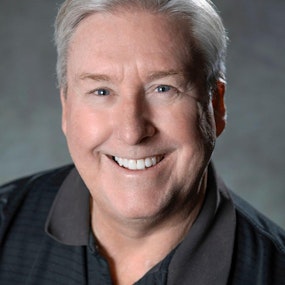
R. Scott Edwards
Creator
Podcast creator, and Producer of Standup Comedy "Your Host & MC" which shares standup comedy and interviews based on my decades of entrepreneurial business success.
New to The Tragedy Academy?
Check out our featured guests!













































